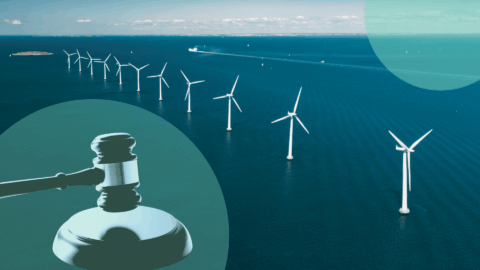Opponents Block Action on Climate Bill – For Now
 This post is by Sheryl Canter, an online writer and editorial manager at Environmental Defense Fund.
This post is by Sheryl Canter, an online writer and editorial manager at Environmental Defense Fund.
This morning a Senate cloture vote to focus debate on the Climate Security Act and end the filibuster failed to win the necessary 60 votes. As a result, Majority Leader Harry Reid removed the bill from consideration this year.
On the plus side, a majority of senators – 48 to 36 – voted in favor, and six more senators sent written statements of support, bringing the total to 54. While the bill could not survive the continuing delay tactics, it garnered important new momentum that sets the stage for quick action in the next Congress.
From Environmental Defense Fund President Fred Krupp:
The din of Washington politics can’t drown out the drumbeat of progress. Old adversaries came aboard and new supporters stood up for action. In the end, we got a stronger vote on a stronger bill than we had three years ago.
Even many opponents of the bill said this week that America needs to cap carbon pollution. The excuses for inaction are running out. With presidential leadership, which was absent in this debate, we’re confident that 2009 will be the year Congress finally gets off the sidelines and begins to fight climate change and our country’s oil addiction.
Senators John McCain and Barack Obama have made clear their support for a comprehensive cap and trade program to reduce pollution, and both said today they would have voted to continue moving forward with it. The bill’s sponsors say they will bring the legislation up again next year.
Cap and trade also is expected to be the centerpiece of a comprehensive climate bill being developed by the House Energy and Commerce Committee. Chairman John Dingell yesterday announced that he would begin hearings this month on legislative proposals, including the Climate Security Act.













9 Comments
Interesting that Hillary, Barak and McCain can’t be bothered to be present for this (not that it would have made the difference).
How does this become a better bill, rather than one that is watered down because it failed the first time?
1) New Senators elected in November
2) Failing that…….????
Quentin
P.S. Thank you for working so hard on this, and for keeping us all so well up to date.
Yes! The New Climate Security Act will auction ALL emission permits, eliminate Nuclear Subsidies, and reduce our emissions to 80% of 1990 levels by 2050. New Senators elected in November and New Reps in the House will be augmented by a New Grassroots – a vigilant and intense posse that won’t see Nov. 4 as the Final Say, but rather as the Starting Gun in a race to change this country back to a nation respected.
We will return to the rule of law and a reverence for the honest truth. Arrogance and Hubris beware! Criminal charges are undoubtedly warranted and the New Generation will not be willing to let the sins of the fathers (and a few mothers) go unpunished. There will be NO watering down!
Bill Moyers is right. We are strong and growing and we will take this country back! Watch his fabulous and inspiring address to the National Conference for Media Reform in Minneapolis, June 7, 2008.
http://www.freepress.net/conference
We will repeal THE TELECOMMUNICATIONS ACT OF 1996 and enforce ANTITRUST laws to breakup these media monopolies. Yes, a reinstated Fairness Doctrine is in order.
Then we will pass Public Financing of Elections and let intelligent and honest folks run for office without having to beg for money or compromise their beliefs. No more FatCats, Lobbyists, and PowerBrokers buying themselves a legislature.
We can do this!
Mary Francis
Pity that the environmental community cannot pursue debate of the cap and trade program.
Unfortunately for you and me, the repugs are right on this one.
C&T is NOT the way to go.
We have married into the free market solutions without proper consideration.
The old SOX-NOX C&T is history.
It worked for one good reason.
There was technology available off the shelf that provided the option to buying allowances.
This is not the case with Carbon.
We have no technology available to capture and sequester carbon from the 50 percent of our electric plants in this country.
That technology will not be available within the 2012 time frame. More like 2020 or later to compare with SOX technology.
The Congressional Budget Office found that C&T is NOT the cheapest and quickest means to achieve our climate change goals.
There is not even a discussion or a link to this months-old publication from the CBO here on the EDF site.
We do a disservice to our grandchildren to pretend that a Carbon C&T can mimic the SOX-NOX acid rain benefits.
When will EDF get its economists to take a look at what we should be doing? Ask Dr. Anne Smith at CRA who have done the most research on the costs associated with policy options for CC.
joebhed’s comment “…the repugs are right on this one.” is another example of name-calling. I’ve seen people use that term “repugs”
to mean Republicans, before. Not nice.
Back to his comment:
(CRA is apparently a consulting firm for corporations.)
The quote below is from CRA’s page on Regulation:
“CRA has supported clients in a wide variety of regulatory proceedings. We assist in drafting regulatory filings and provide expert witness testimony. Our ability to perform sophisticated economic and statistical analyses and to explain our results in ways that regulators can easily understand help our clients build make strong cases to support desired outcomes.”
Translation – simply tell us your desires and we’ll make it happen.
Not a very principled stance.
Suggestion: joebhed should watch this new video on Carbon Capture and Sequestration (CCS) to learn how it works and why it is important.
” CCS can dramatically reduce carbon emissions from coal plants. The IPCC’s Special Report on Carbon Dioxide Capture and Storage says that “a power plant with CCS could reduce CO2 emissions to the atmosphere by approximately 80-90% compared to a plant without CCS.” This is after taking into account the extra energy needed to capture and compress the CO2. ” says Scott Anderson, an attorney and senior policy advisor at the Environmental Defense Fund.
Meanwhile, over on Dot Earth, Andy Revkin has written about an alternative to the “cap and trade” pricing approach known as “cap and dividend”. The scheme, being strongly endorsed by NASA climatologist James Hansen, is based on the principle of making the polluter pay without placing the burdening of rising costs on the consumer, the most commonly cited down-side of “cap and trade.”
Read the full story here. http://dotearth.blogs.nytimes.com/
Mary Francis
Oops… meant to include the link to the video on Carbon Capture and Sequestration.
http://www.ccs-education.net/
Mary,
Hmmmm. Life is an education.
I wanted to be friends, and promote some good public policy.
So we understand each other –
I am a lifelong environmentalist, organized community environmental groups, and worked in energy policy all my life.
Including as public utility manager – I implemeneted the most comprehensive electric utility efficiency program in the country. If not the world. By any mark.
Assets, Consumers, Revenue.
But, why shoot CRA?
You’re right they can be hired by anyone.
And, they work for people who support cap and trade.
(Like EDF)
I mentioned Dr. Anne Smith.
She is one of CRA’s top economists, having testified on the CC bills, at Congress’ request.
It was Dr. Smith’s personal opinion I tried to cite, not CRA’s.
She fully supports the findings of the Feb. 2008 Congressional Budget Office(CBO) report on the Policy Alternatives for Climate Change.
This study found the carbon tax to be the cheapest and quickest way to achieve our climate change goals.
What does EDF have to say about the findings of the CBO?
As for sequestration, I know what it is, and where the technology stands. That’s why I said, it would not be available, commercially for new or retrofit to power plants, before 2020, if that.
You ignored my comment.
Electric cooperatives have done more than any other sector on sequestration.
Again I was a co-op manager and continue to serve on the national Board of the co-ops, having spent three years as chair of their Energy Policy, Regulatory and Legal Committee.
I am an environmentalist, and…
I am going to call Scott Anderson at ELF and ask if he believes I am wrong. Please forward.
The issue, in case I was not clear, is this.
All the bills promoted by the enviromental community are based on the eroneous premise that we can recreate the success of the acid rain cap/trade program.
UNTIL we have solutions that are available off the shelf, consumers are going to pay unnecessarily high energy bills. And those costs could run into the Trillions.
Why?
With a carbon tax, we could create a revenue flow that matches our ability to do what need to be done.
That includes getting the $$ needed to see that CCS does not slip further down the calendar.
Sorry, I didn’t mean Environmental Learning for the Future.
I meant EDF.
To Joebhed:
I may have to make an apology for misreading your comments. Will get back to you on that.
In the meantime, I would like to hear your opinion on NASA climatologist James Hansen’s “Cap and Divide” principle, which would make the polluter pay without placing the burdening of rising costs on the consumer, a well-known down-side of the classic “cap and trade.”
Find article at: http://dotearth.blogs.nytimes.com/
Mary Francis
I found Dr. Hansen’s proposal here:
http://www.columbia.edu/~jeh1/mailings/20080604_TaxAndDividend.pdf
I read it.
I believe I understand the proposal, but not the solution.
I do not support it.
What don’t I understand?
First, will the polluters be forced by the tax to “do the right thing”?
Or, what?
Consumers will pay.
Being a utility manager I have seen what happens when there are “cost-recoverable” mandates.
Utilities pay, and pass along the costs.
Consumers pay.
Look where the RPS mandates have taken electricity costs in the NE states.
(i TOTALLY opposed deregulation as it was done just about everywhere – another “build it and they will come” mandate)
To what benefit?
Where are the renewables?
Look at my co-op in Vermont – probably the most renewable utility in the east. Because we invested.
Things don’t happen because of mandates.
They happen because of investments.
Investments don’t happen because of mandates.
Unless they are also economical.
Such as was the case for the SOX-NOX C&T on acid rain.
Again, if CCS is not commercially available until 2020, there should be no mandate to do it until then.
The question becomes how quickly we can develop the commercial CCS technologies – then, how do we fund the development of those technologies – and you can see where the carbon tax gets its “currency” in this.
As an environmentalist, I see a huge problem when solutions are proposed that ostensibly harm the corporations and businesses.
They pass those costs on to the consumer and taxpayer.
IN THE END ALL COSTS WILL BE PAID BY THE CONSUMER AND TAXPAYER !
You need to build an energy/environment policy with that truism as its core.
Dr. Hansen proposes that there is a flow of funds – vis:
Polluters pay a tax to the government and the government pays the money back to the taxpayers.
wheeee!
Feels good.
Ummmm…. where does the money come from for the investments that are absolutely needed in the technologies to achieve both energy and carbon sustainability?
From some other legislation?
The way I see it, Dr. Hansen, all the environmental groups, all of the Congressional leaders are running scared from that “tax” word.
I hope y’all are reading the futurists on what is wrong with America.
We are not paying our way.
We need to step up to what needs doing, and what needs doing is “the right thing”.
And, that is a carbon tax.